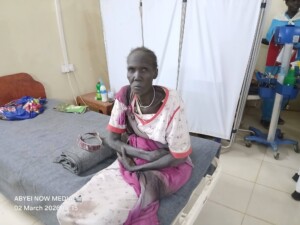African, Sudanese NGOs raise alarm bell over Ethiopian dam dispute
The long-running dispute between the governments of Ethiopia, Sudan and Egypt over the building, filling, and operating of the Grand Ethiopian Renaissance Dam (GERD) is raising serious concerns about the impact of the Africa’s largest hydroelectric power plant on Sudan and Egypt. In a statement yesterday, 22 NGOs warn for military confrontations between the three countries.
 Global view of the Nile Basin (NASA)
Global view of the Nile Basin (NASA)
The long-running dispute between the governments of Ethiopia, Sudan and Egypt over the building, filling, and operating of the Grand Ethiopian Renaissance Dam (GERD) is raising serious concerns about the impact of the Africa’s largest hydroelectric power plant on Sudan and Egypt. In an urgent statement yesterday, 22 NGOs warned for military confrontations between the three countries.
The Ethiopian mega dam project* is currently in the final phase of its construction. In August last year, Addis Ababa unilaterally began filling the dam reservoir. Tripartite talks under auspices of the Africa Union have reached deadlock upon deadlock.
The 22 civil society organisations “wish to ring the alarm bell about the tense situation that prevail between Ethiopia, Egypt and Sudan over the construction and operating of GERD.
“It is of great concern that some media pronouncement from top level authorities in these countries show no compromises, often hinting that the situation could degenerate into full-blown military confrontations,” they state.
“With its storage capacity of 74 billion cubic meters GERD is, therefore, the largest dam in Africa and the 15th largest hydroelectric power plant in the world. The project is expected to have profound effects on the future of the three countries and the African sub-region. While it represents an important development opportunity for Ethiopia as its prime owner, the impact of GERD on Sudan and Egypt cannot be overlooked.
The UN Security Council must ensure that the disagreement between the three countries is resolved in a negotiated peaceful manner that saves the African sub-region from the scourges of political and legal conflicts or military confrontations in the worst-case scenario. – Group of 22 concerned NGOs in Sudan, Geneva, and various African countires
“GERD is expected to boost socio-economic development in Ethiopia, regulate water flow and reduce the annual floods during the rainy season which will enable Sudan to better manage its irrigation and hydroelectric power system, the dam will dramatically change the water flow regime of the Blue Nile River by flattening its hydrograph thus causing significant negative impact on Sudan and Egypt,” the statement reads.
“It is therefore crucial that the three countries agree on a legally binding and acceptable formula to ensure that GERD is meticulously designed, constructed, filled and operated. This is the only way to ensure that the negative effects of such a mega dam are properly addressed and mitigated in close consultation and coordination between the three countries.”
The NGOs call on the governments of Ethiopia, Egypt, and Sudan “to respect their obligations under the AU Constitutive Act and to negotiate in good faith in order to reach a legally binding agreement on the outstanding issues”.
They urge the UN Security Council to treat the dispute as a matter of top priority, and persuade the parties not to take unilateral measures concerning the technical and legal aspects of GERD “before reaching a comprehensive agreement that ensures smooth cooperation in the future”.
The Security Council must “ensure that the disagreement between the three countries is resolved in a negotiated peaceful manner that saves the African sub-region from the scourges of political and legal conflicts or military confrontations in the worst-case scenario”.
Signed: 1. African Centre for Democracy and Human Rights Studies (ACDHRS), Banjul, 2. African Centre for Justice and Peace Studies (ACJPS), Kampala, 3. Afrika Jom Center, Dakar, 4. Al-Khatim Adlan Centre for Enlightenment & Human Development (KACE), Khartoum, 5. BangGwe et Dialogue, 6. Centre du Commerce International pour le Développement (CECIDE), Geneva, 7. Civil Society Reference Group (CSRG); Nairobi, 8. Comité pour les 50 Ans de l’Union Africaine, 9. Conseil Mondial de la Diaspora Panafricaine (CMDP), Geneva, 10. Darfur Bar Association, Khartoum, 11. Forum de la Radiotélévision des droits de l’homme (FRTDH), Brazzaville, 12. Guinée Développement (GUIDE), Conakry, 13. Human Rights Advocacy Group for Democracy, Khartoum, 14. Independent Commission for Human Rights, Rabat, 15. Omar Al-Mukhtar International Association, Geneva, 16. Organisation de l’Unité Syndicale Africaine (OUSA), Accra, 17. Pan-African Forum on Rights and Development (PAFRD), New York, 18. Regional Center for Training and Development of Civil Society, Khartoum, 19. Rencontre Africaine pour la Défense des Droits de l'Homme, Dakar, 20. Rwanda Women Network, Kigali, 21. Sudanese Civil Society Initiative, Khartoum, 22. Union Interafricaine des droits de l’homme, (UIDH), Ouagadougou.
Read the full text of the statement here.
* The dam which Ethiopia began to build in 2011 at the source of the Blue Nile, near the border with Sudan, is currently in the final phase of its construction. In August last year, Addis Ababa unilaterally began filling the dam reservoir.
The Blue Nile contributes approximately 85 per cent to the volume of the main Nile River. Both Egypt and Sudan heavily depend on the waters of the Nile to meet the demands of their growing populations.
The three countries signed a Declaration of Principles in Khartoum in 2015 as a basis for negotiations, but no agreement on the use of the Nile waters has been reached so far. More than once, negotiations under auspices of the Africa Union ended in a deadlock. Recently, the EU and the USA have both expressed their willingness to mediate between the three countries.











 and then
and then